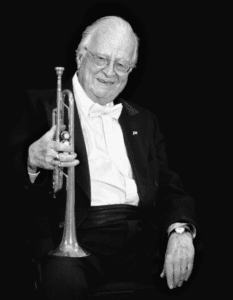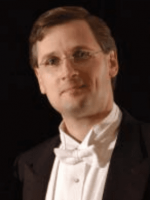Hagstrom:
What was it like starting out as first trumpet of the Chicago Symphony under the working conditions that existed back then?
Herseth:
When I joined the orchestra, you could be let go anytime they wanted–in the middle of the year if they felt like it–for whatever reason, in those days. Let’s see… I started in the summer of 1948 at Ravinia, which was a nice way of starting, and I got to play under conductors like Ormandy, Fritz Reiner (that’s before he got the permanent job, of course). So I got exposed to a lot of good music and some very nice conductors, and for a total greenhorn, which is what I was in terms of symphonic playing, it was a marvelous experience. Then we had the first two winter seasons here with guest conductors because Artur Rodzinski, the conductor that hired me, had been fired by the time I started with the orchestra. It’s kind of interesting too because I played an audition for him in his 5th Avenue apartment in New York because George Mager, my teacher in Boston, knew Rodzinski. Rodzinski had a summer place in Tanglewood (the Boston Symphony’s summer home), so I got a telegram from the manager here (George Kuyper) to go to New York to play for Rodzinski. Yeah, I played about an hour. I had heard a lot of this stuff by the Boston Symphony and on the New York Philharmonic broadcasts on Sunday afternoons, and that sort of thing. There weren’t as many records around as there are today, so I took all the trumpet parts I could find from the conservatory music library and also the Boston Public Library music section. I just said, “I’m going to play this,” and “I’m going to play that” and then “I’m going to play that,” and he would say, “Well try to play it a little faster, or can you give it a little difference?” or whatever, and when I got all done, he said, “Well, you’re my next principal trumpet player.” And I said, “Okay, I’ll go home and practice.” But he said, “I would also like to hear you in Orchestra Hall in Chicago where the orchestra performs.” I think all he wanted to do was to see if I could do it again. That’s all. No question. I made it that time, too, and so when I finished, he was there with John Weicher, the concertmaster, and he said, “Well, you have passed summa cum laude.” I said, “Well, I’m glad I studied Latin because I know what that means. Thank you.” (hearty laughter) And the first two seasons were all guest conductors–seven of them–from big orchestras, Europe and here, and several of them were kind of looking for the job–get their foot in the door a little bit, you know–and so they were all allowed to come with their biggest, most familiar repertoire that they really liked to do, so I suppose I would consider that in those first two summers and winter seasons I was probably exposed to as much big-time repertoire in those two seasons [those two years] as I would have been in maybe three or four normal years. So it was terrific. I went in and enjoyed it every day and worked my butt off–and you know what that means–(laughs) and enjoyed it, and we had a lot more time off then so we’d jump in the car and head up to Minnesota where Avis and I are both from and off we’d go and spend three or four weeks at the lake eating Walleyes. (laughs)






